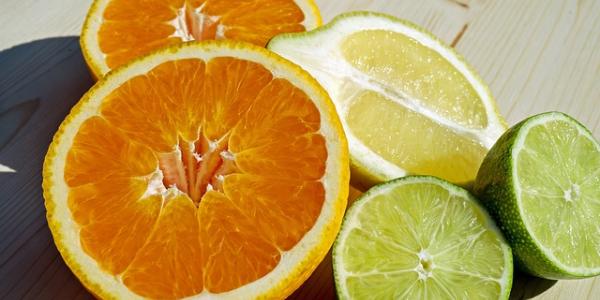FOOD FACTS
CITRUS FRUITS
Note: There are only four original citrus species (pomelo, citron, mandarin, and papeda). All others (lemon, lime, grapefruit, etc.) are hybrids.

Citrus fruits have beautiful juicy pulp and a delicious zing in every bite.
SEASON
Citrus fruits hit their peak during the winter months when we could all use some edible sunshine. It’s the perfect time to add vibrant citrus colors and flavors to your meals. Depending on the type, the season can run from late fall to late spring. Exception to this rule: Valencia oranges are in season during the warmer months, providing the most popular citrus for summer juicing. Other exceptions are lemons, limes and grapefruit which are usually available throughout the year.
SHOPPING
Citrus fruits do not continue to ripen once they are picked from the tree. Choose the heavier specimens—they’ll be juicier. Then take a whiff—a sweet fragrance often means good flavor. In terms of appearance, you will want a smooth textured peel versus a thicker, bumpy peel. Make sure to avoid the fruit that has soft or mushy spots.
STORING
Citrus peel is porous, losing moisture and flavor with time. How you store your citrus makes all the difference. Citrus fruits will keep best, up to several weeks, when placed in the refrigerator’s crisping drawer. For juicing or eating, take citrus fruits out of the refrigerator at least 15 minutes prior to use to allow them to reach room temperature, the sweet spot for releasing juice and tastiness. If storing at room temperature, citrus fruits will stay for a few days up to a week. Whether it is in the fridge or on the counter, avoid putting your citrus fruits in an airtight container or bag. Lack of airflow leads to soft, mushy texture that is never appealing. The one exception to the plastic bag rule is lemons. Lemons keep best in a plastic bag stored in the refrigerator’s crisping drawer.
PREPARING
Citrus is delicious no matter how you prepare it. Let’s count the ways:
- Grate only the colorful outside of the peel to produce zest for presentation or depth of citrus flavor.
- Juice it! There are many tools available to juice by hand, which requires a little more effort than an electric juicer. In a pinch, a fork twisted in the pulp loosens the juice for hand squeezing. Another handy kitchen tool for squeezing juice is a pair of tongs—cut the fruit in half, grab a half in the handle of the tongs and squeeze!
- The easiest way – use it for salads or snacks. Peel or cut the fruit and then spoon or pull out sections by hand.
FLAVOR
Listed in order from tart to sweet:
- Citron: Very, very strong tart flavor. Most often the pith and rind are used for jam, preserves, or candying. Citron pith is boiled to create a dressing.
- Buddha’s Hand: Although it does not provide juice or pulp, the pith is edible and provides a mild sweet flavor. It may provide fragrance in your home or zest in salads or drinks.
- Lemon: Acidic, tart, sharp flavor. Great for garnish, zest, or salad dressing.
- Lime: Acidic, tart, zing of flavor. Great for garnish, zest, or salad dressing.
- Ugli Fruit: While not pretty, its flavor is a sweet surprise! It is a wonderful addition to fruit salad or peeled like a grapefruit.
- Grapefruit: Juicy, with a touch of bitterness. Perfect for breakfast or salads.
- Kumquat: Tart and sweet! Easy to eat by hand or use to make marmalade.
- Pomelos: Similar flavor to grapefruit but without the bitterness. Delicious in salads or eaten alone.
- Tangerines: Less tart than oranges but just as sugary. Great addition to fruit bowl or eaten by hand.
- Moro Oranges: Less acidic flavor with a hint of berry in it. Often used for its beautiful dark red presentation.
- Clementine Mandarins: Mild and sweet. Well known for being the small, easy to peel, snack-size orange.
- Navel Oranges: Touted as the best tasting orange. Juicy and full of flavor. The best orange to eat by hand.
- Valencia Oranges: Thirst quenching, sugary flavor. The very best orange for juicing!
NUTRITION
Source of vitamin C, fiber, and carbohydrate.
by Abi Smith, Dietetics Student, Class of 2018
Peggy Crum MA, RD
